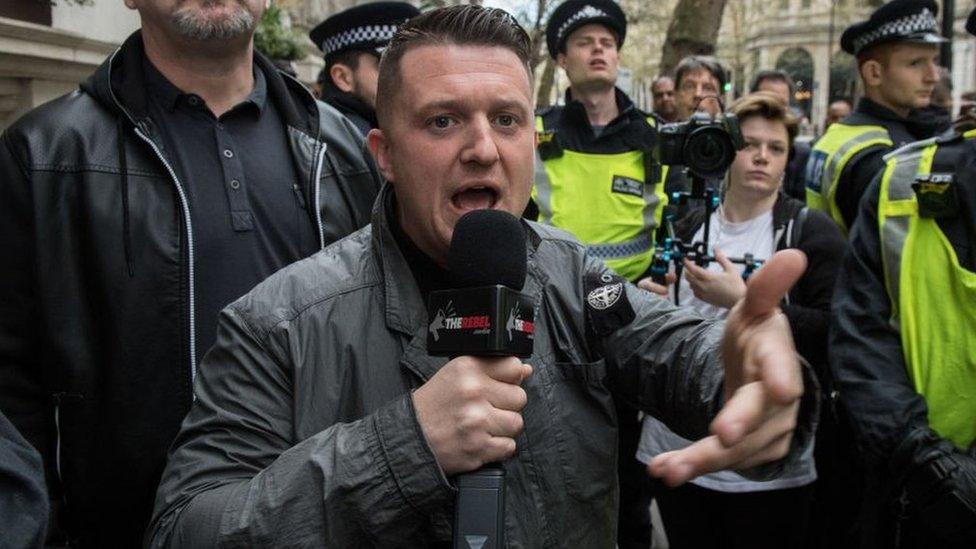Ex-EDL leader Tommy Robinson jailed at Leeds court
- Published
Tommy Robinson was arrested outside Leeds Crown Court
Former English Defence League (EDL) leader Tommy Robinson has been jailed for potentially prejudicing a court case, it can be reported.
Robinson, who appeared in the dock under real name Stephen Yaxley-Lennon, was arrested in Leeds on Friday.
The 35-year-old was broadcasting on social media outside the city's crown court where a trial was ongoing.
A ban on reporting his 13-month sentence at the same court was lifted after being challenged by the media.
Robinson, from Bedfordshire, was found guilty of a charge of contempt of court.
A judge told him his actions could cause the ongoing trial to be re-run, costing "hundreds and hundreds of thousands of pounds".

Tommy Robinson founded the EDL in 2009 but quit the group in 2013
In footage which was played to the court on Friday, Robinson was seen filming himself and people involved in the trial.
The court heard how the footage, which supposedly lasted around an hour, had been watched 250,000 times within hours of being posted online via Facebook.
During Friday's hearing, Matthew Harding, defending, claimed that his client had "deep regret" for what he had done.
"He was mindful, having spoken to others and taken advice, not to say things that he thought would actually prejudice these proceedings," Mr Harding said.
"He did not try to cause difficulties for the court process."
Judge Geoffrey Marson QC said: "Not only was it a very long video, but I regard it as a serious aggravating feature that he was encouraging others to share it and it had been shared widely.
"That is the nature of the contempt."

Why contempt of court matters?
By Dominic Casciani, BBC home affairs correspondent
Contempt of court is the crime of ignoring the court and its constitutional role in making sure that justice is done.
Robinson was convicted of contempt for interfering with a trial in Canterbury.
His attempts to film defendants on that occasion could, the judge said, have "prejudiced" the jury, leading to an unfair verdict - and he was warned he'd go to jail if he did anything remotely similar again.
Why couldn't we initially report Robinson's arrest and jailing? Reporting restrictions are a long-standing part of the British legal system. In this case, the judge ordered a temporary media black-out because he feared reporting Robinson's conviction could influence the jury in the very case Robinson was targeting.
This is not some new form of censorship directed at Robinson. These are rules that apply to us all, equally. If he is unsure about that, he's now got time on his hands to read a copy of Essential Law for Journalists.

Robinson was already subject to a suspended sentence for a contempt charge related to a separate case in Canterbury.
The judge had warned him then he should expect to go to prison if he committed further offences.
Robinson was given 10 months in jail for contempt of court, and a further three months for breaching the previous suspended sentence.
Judge Geoffrey Marson QC initially imposed restrictions for fear that reporting his arrest would prejudice an ongoing trial.
Following the arrest there were protests outside Downing Street over the weekend.
Robinson founded the far-right EDL in 2009.
It became known for its street marches and demonstrations in towns and cities before he quit the group in 2013.
Update 29 November 2018: This article has been amended to remove a reference to Tommy Robinson pleading guilty to a charge of contempt of court.